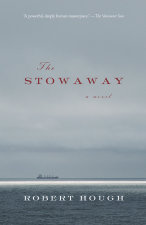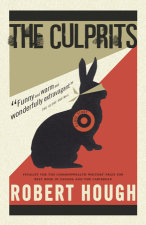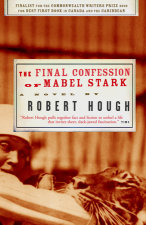
The Stowaway by Robert Hough
One
A knocking comes at the door of the bosun’s cabin, followed by a hoarse whisper, seeping through metal.
“Hey, Bose, time to get up.”
Rodolfo Miguel stirs. His nickname is called again, and this time he mutters, “All right, Manuel, I’m awake.” Beneath him, the big ship undulates, and produces the hollow groan of a hull on water.
The grey shrouding his quarters could be the light of early day, or the shadow of late afternoon, or the portent of a storm, and for a moment the bosun feels confused. Yet as his dreams dissipate, his situation crystallizes — morning shift, containers on board, early March, the weather brisk and overcast. He rises, rubs his eyes, and lowers himself to his knees, his forearms resting on crumpled bedding. For the next minute he is still, and alone, with God.
When he’s finished his prayers, he changes into dark blue coveralls, straightens his bunk, and puts on the deck shoes he always leaves on a mat outside his cabin door. After crossing the corridor to the WC, he washes his round face and brushes his teeth and combs his thick, dark hair. Back in his cabin, he checks himself in the small plastic-framed mirror tacked over his dresser; in the weak light of the room, his skin looks coppery and dull, like a bell that’s been exposed to weather.
He locks his cabin door and moves quickly through the halls of the seamen’s level before reaching the stairs leading to the crew mess. When he enters, only two of his able-bodies, Manuel and Angel, are still there, lingering over coffee, smiling at their bosun’s predeliction for sleeping until the last possible moment. Manuel rises, and sits when Rodolfo motions with his hand.
Rodolfo helps himself to food turned lukewarm in the service line — eggs, toast, strips of bacon shrivelled into corkscrews — and he pours himself coffee, flavouring it with cream and spoonfuls of sugar. When he sits, Manuel and Angel are taking deep, final pulls off their cigarettes, the air between them a wispy, corroded blue.
“So,” Angel says, “what’s it going to be like today?”
“Can’t say.”
“Maybe a storm?”
“Maybe.”
“It could clear, too.”
Rodolfo shrugs, and chews his breakfast. After a minute, Angel stands and heads toward the deck. Manuel says, “More coffee, Bose?” and when Rodolfo shakes his head, the AB rises as well, Rodolfo noticing the fine tremour in Manuel’s fingers as he pushes his chair back into place. Often, Rodolfo worries about Manuel’s health, for he knows he eats poorly, and smokes too much, and takes thing too seriously. As he walks away — “See you on deck, Bose” — Rodolfo asks himself how many voyages he’s been on with Manuel. Has it been a half-dozen? More? At times he feels as though he knows Manuel’s face better than the faces of his own children. At least with Manuel, he’s more or less the same every time we land on a boat together. But with my babies? Each time I come home, they’re different. Each time I come home, they’ve changed.
He swallows a mouthful of egg, and calls out, “Okay, okay. Tell the others I’ll be there in a minute.”
Rodolfo drains his coffee, and takes a last bit of bacon before scraping the remnants of his breakfast into a metal can lined with a green garbage bag. He heads to the deck. There, he spots his Taiwanese chief officer, who is slowly practising karate moves as he waits. When the officer hears footsteps, he stops, his hands momentarily suspended in the air.
“Chief,” Rodolfo says, “sorry to be late.”
“Don’t worry. Is happen, Bosun. Is happen sometime.”
“Yes, yes, with some more than other, no, Chief?”
The chief officer smiles, a lattice of creases extending from the corner of each eye. “The weather, maybe is bad today.”
“Yes. Maybe. But could clear, also.”
“You are know what to do today?”
Rodolfo nods.
“Good.”
The two men chat in poor English for a minute more. When they part, the chief officer returns to the door of the accommodation, and takes the stairs back up to the bridge. From where he stands, Rodolfo can hear the man’s footfalls resonating from within the stairwell.
Rodolfo’s ABs have gathered next to the storeroom, where they are smoking cigarettes and huddling against the brisk, salty wind; when Rodolfo arrives, they are discussing whether the clouds will fade into streaks, or darken further and produce a chilled, spitting rain.
“Well, Bose?” one of them asks. “What are we doing?”
Rodolfo smiles, as though the question were a joke — they’ve been doing the same job since the voyage began in Bombay, and they all know they’ll be grinding, stripping, and sanding the deck. All five of the ABs groan, throw up their hands, and jokingly complain. Then they dig out their sanders and head to the starboard aft, where they’d left off the day before.
Rodolfo begins his tour of the deck. As always, he starts with the starboard side, his eyes sweeping the metal surfaces of the Maersk Dubai. He checks that the container lassos are tightly winched, and as he passes the various hydraulic systems — hatch covers, windlass, mooring — he looks for rivulets of leaking motor oil. At the bow of the ship, he considers checking the void tank levels via the sounding tubes that reach to the depths of the hull, but decides not to — despite the choppiness of the ocean, and the intermittent listing of the past few days, there’s no reason to suspect any of the holds have taken on water.
Instead, he moves to the port side and leans against the gunwale. The air is heavy with ozone. There are whitecaps and swells. The clouds are low-lying, full, and the grey-blue of a rifle. Rodolfo blinks away the salted mist, and peers far into the distance, to the place where the eye plays tricks on a sailor far from home — though there is nothing but ocean for thousands of kilometres, he imagines he can see an ochre sweep of hill and valley, and a yawning of off-white beach. He begins his tour back down the port side. The boat shifts and heaves beneath his feet, his sea legs responding in a way that is automatic, and not noticed by the sailor. Behind him, over the stern, comes a momentary break in the clouds. A shaft of sunlight, bleary and cream coloured, casts shadows for the first time since the big ship left Spain, momentarily warming the bosun’s shoulders. Then, just as quickly, the clouds reassemble, and the greyness of the day returns.
Copyright © 2004 by Robert Hough
Born in Toronto in 1963, Robert Hough knew he wanted to become a writer back in high school. After graduating in 1985 from the Queen's University, where he wrote satirical articles for the arts paper, Hough worked briefly in advertising before becoming a journalist. For about a dozen years, he wrote for such magazines as Toronto Life and Saturday Night before turning to books. Hough's first book was originally intended to be a biography of Mabel Stark, a promiscuous and ribald 1920s lion tamer for Ringling Brothers Circus. Due to a general lack of documentation on Stark, Hough decided to write a novel instead. Published to rave reviews in 2001, The Final Confession of Mabel Stark was shortlisted for both…


